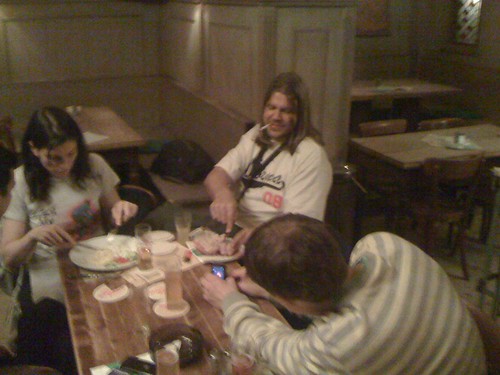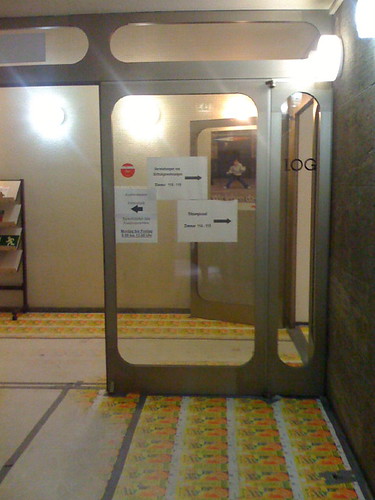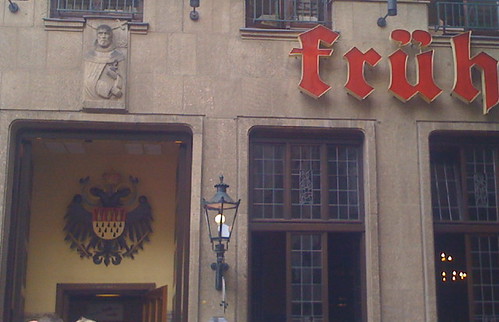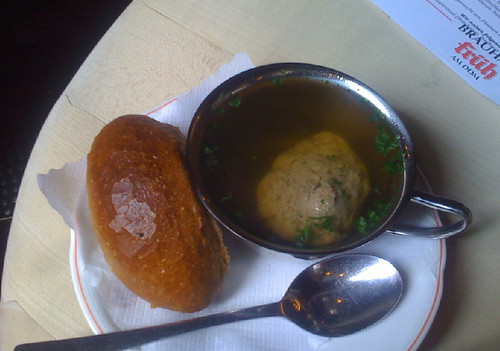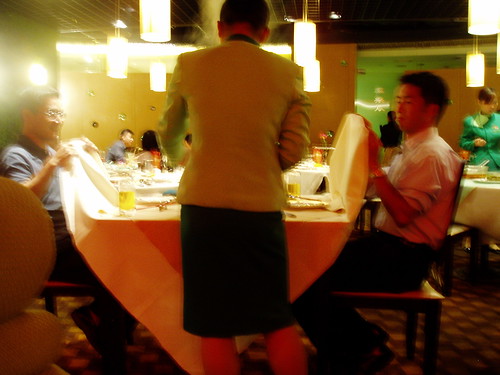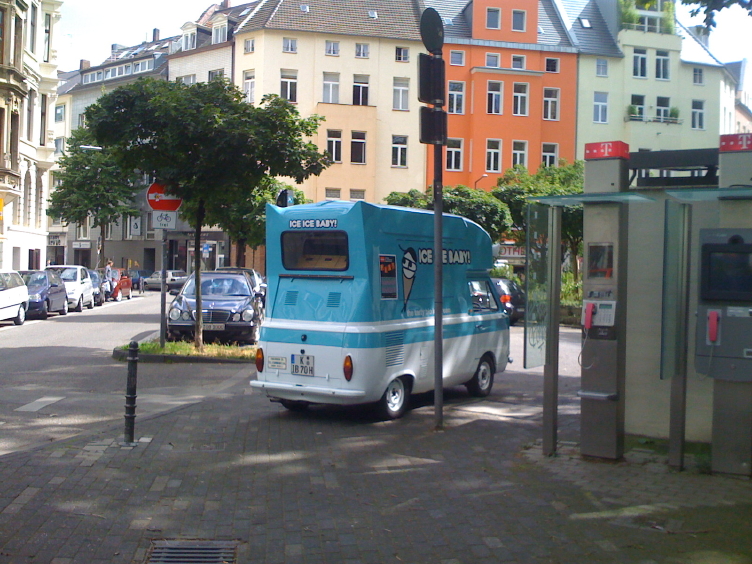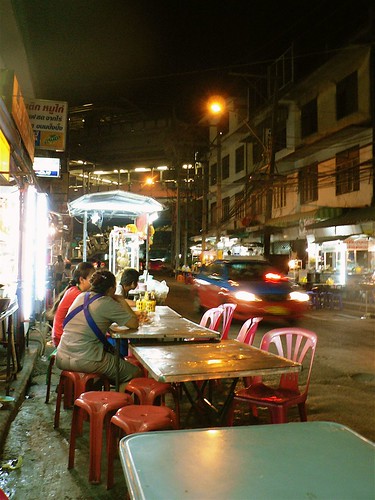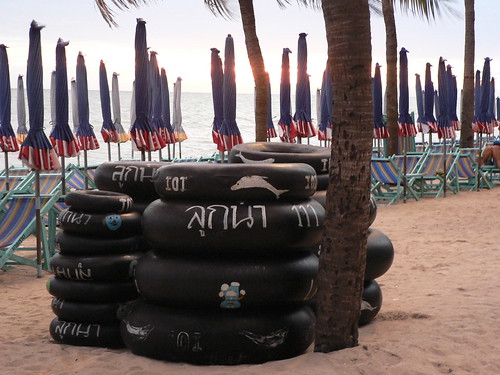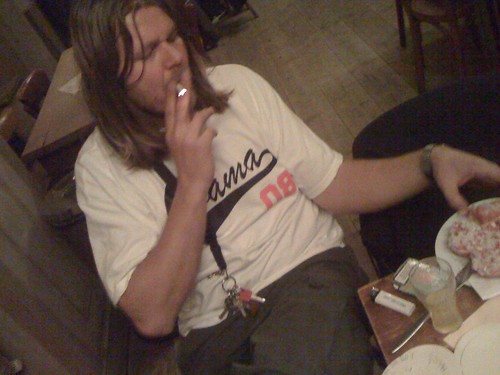
I wish one of us had had a proper camera that night at Brauhaus Putz. I love how my colleague Wulf looks like a weather-beaten politico who just spent 23 hours in the war room, and is now enjoying a well deserved fag with some raw mince.
Maybe some Republicans think Germany is full of people like this: who wear Obama t-shirts and smoke Players P&S while eating raw mince & onion on crisp white buns.
On the subject of smoking & eating, I was just reading
an article from February last year about the latent smoking ban in Germany. It quotes Claudia Picht, whose
organic café Metzgerei Schmitz was an extreme anomaly last year with its self-imposed smoking ban. She was quoted as saying "I don't see the non-smoking principle of my café as a prohibition, but as a special offer to those people who want some fresh air." Aw.
"They keep telling the barkeepers that a smoking ban would decrease their rates. I think people have to be very courageous to say: 'I will do it anyway! I will turn my bar into a non-smoking place.' And then they find out that drinking coffee can also be wonderful without a cigarette!'"
Meanwhile the old guard of non-organic sausage-loving Germans is represented by Meinolf Saure, the owner of the monolithic Brauhaus Früh. He is quoted as saying "I cannot support a general ban, for a bar without smoke would be nothing." But he admits that he is also happy about the non-smoking areas. "We have established them on every level of our bar and they are a huge success."
The jury is still out on whether eating a raw mince mettwurst brötchen without a cigarette can also be wonderful.
Ironically, my workmate Wulf took up smoking again when he was in North America. The smoking ban in Toronto meant that people would go outside for a chat and a fag, and since he is so tall he found this an easier way to converse than trying to shout down at people in the noisy club.
As New Years approached last year, I was less excited about clinking glasses of 'sekt' bubbly than I was about the promised moratorium on smoking, about to be introduced in clubs. Most eating and drinking venues in Germany are not air-conditioned. The ban felt long overdue - other European countries with a strong penchant for smoking had banned it in public spaces, what felt like ages ago (Italy, Ireland, England, even France). Not without protest. A Parisian cafe-owner, Olivier Colombe, was quoted in the Independant last December as saying "Long dinners with several bottles of wine and lots of discussion are going to be difficult".
It sounds like he needs to sit down for a delicious cup of coffee with the über-upbeat Claudia Picht.
Just before New Years, the governors of North Rhein Westphalia decided that they would push the start of the ban back so that the fine Kölle folk could smoke it up during the traditional carnival season. Then, when I thought the ban would finally trudge into effect on July 1st, a loop-hole was discovered to allow smaller venues who don't have room for a 'non-smoking' area to become members' smoking clubs.
The Federal Constitutional Court ruled on July 30th in favour of plaintiffs who said the constitutional rights to property and to exercise one’s profession were at stake, easing smoking bans for at least 60,000 one-room establishments. It's a convenient loop hole that has been jumped on enthusiastically by all the local discotheques (which are, by the way, not necessarily all that small).
The Economist wrote on the 24th of July that "The German Hotel and Restaurant Association says smoking bans have cost small bars and restaurants 30% of their revenues. That shakes a pillar of social life: the Stammtisch, a regulars’ table at the corner bar where fellowship is forged. If people cannot smoke at Köpi, says its bartender, “we would lose our regulars”.
Anti-smoking campaigners have long found Germany a hard case. Last year the Swiss Cancer League ranked the tobacco-fighting zeal of 30 European countries, and placed Germany 27th. The new smoking bans might improve its ranking, but they are riddled with 130 exemptions, complains Martina Pötschke-Langer, of the German Cancer Research Centre."
130 exemptions is quite an achievement in my opinion. That's something worth bragging about. I'm amazed at the number of loopholes that the normally fastidious Germans have allowed to permeate this veritable legislative sieve. And 'strict' is clearly a matter of interpretation.
Five days ago, bloomberg.com published the following confusing news item. The court begins by upholding the law with no members' club exceptions in straight-laced Bavaria, but then sidles around it by claiming that smoking in beer tents (which also serve a number of Bavarian food delicacies) can be allowed until the end of the year because it is of a temporary nature.
"The Bavarian law is in line with a July 30 ruling that permits smoking bans as long as they don't allow for exceptions, the Karlsruhe-based Constitutional Court said today. Allowing smoking in beer tents until the end of this year doesn't breach rules because the exemption is of a temporary nature, it said. The Bavarian state law, one of the strictest in Germany, doesn't apply to clubs with a restricted membership because they aren't open to the public."
Say whut? Isn't saying something is allowed simply because it's temporary, the very definition of an exception?
Bavaria, sorry mate, I don't think you are as strict as you are cracked up to be.
Most people I've asked still don't think the tobacco lobby is especially strong here: they think all this poking loop-holes in the fabric of the law is down to the strength of the German Hotel and Restaurant Association (DEHOGA). The DEHOGA insists that as long as the consumption of tobacco is not generally forbidden it should remain a personal decision whether or not to smoke in a bar.
But some, like Claudia Picht, are pretty sure the tobacco lobby is meeting up with the DEHOGA in some war rooms of their own.
The Economist commented that it is hard to prove, although cigarette ladies are a fixture at political parties’ conventions. "Germany has conducted no large-scale campaign on the dangers of passive smoking, says Dr Pötschke-Langer. Despite boosting taxes recently, cigarettes are still cheaper than in Britain and Ireland. The share of the adult population that smokes has dropped from more than half in 1950 to around a third, but smoking rates remain among the highest in Europe."
